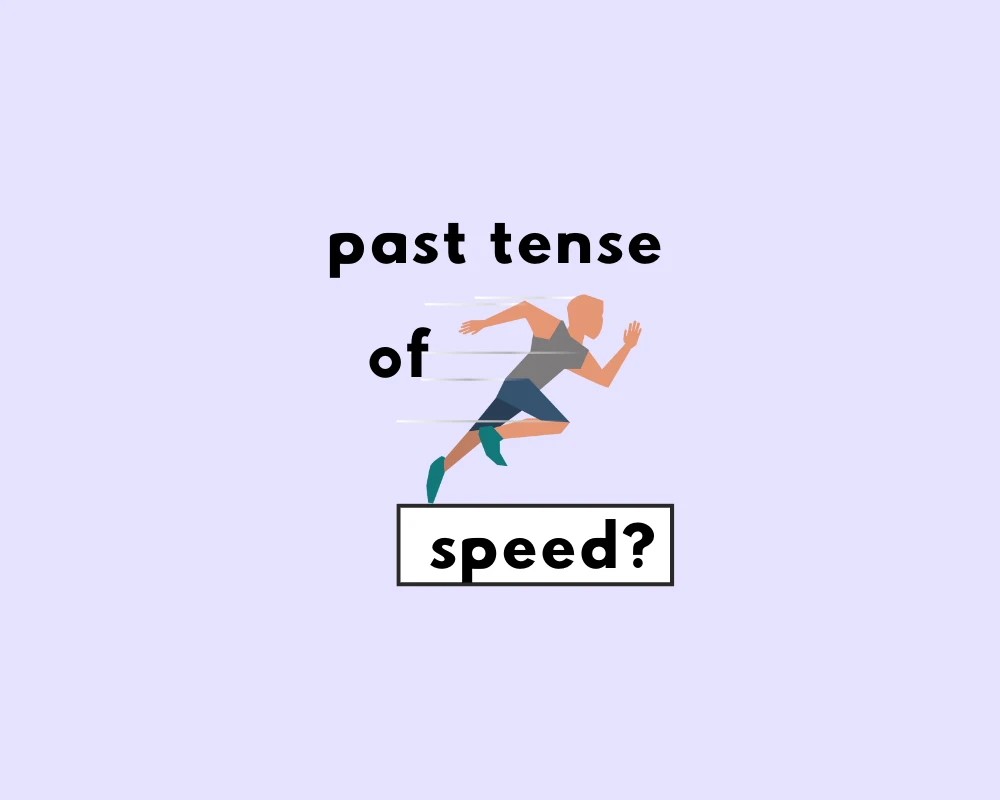
What’s the past tense of “speed”?
The consensus seems that both speeded and sped are both correct past tense and past participle forms of the verb speed.
The car sped down the highway.
The train speeded up as it left the station.
The deer speed into the forest.
She has speed through all her chores.
That said, sped is speedily (adverb) becoming the more prevalent past tense and past participle, with speeded mainly being used as a phrasal verb, (followed by –up). Feel free to speed through this one—and enjoy the reoccurring dad jokes.
The gist on the verb ‘speed’
The topic is the word speed, which can be both a noun or a verb. As a noun, it refers to “the rate at which an object covers distance.” As a verb, it refers to “moving along quickly”; as in “we sped up when we heard the dog’s barks getting closer”.
So, for example, in describing myself, I could tell someone that ‘I’m not the kind of person who speeds out of bed in the morning’. This is true, and also shows speed in the third-person present singular form. Take a look at the other verb forms of speed:
| present | past | future | |
| simple | I speed | I sped/speeded | I will speed |
| continuous | I am speeding | I was speeding | I will be speeding |
| perfect | I have sped/speeded | I had sped/speeded | I will have sped/speeded |
| perfect continuous | I have been speeding | I had been speeding | I will have been speeding |
Irregular verbs like “speed”/”sped”
| base verb | past tense | past participle |
| lead | led | led |
| speed | sped | sped |
| bleed | bled | bled |
| feed | fed | fed |
| breed | bred | bred |
When to use “speed” vs. “sped”
The simple past tense of speed (rhymes with beed) is sped (rhymes with shed). But what’s the difference between the simple past tense sped, and the past participle sped (or speeded)? See a comparison of both past forms of the verb sped in context:
The paperboy sped/speeded through the neighbourhood on his bike
They had speeded/sped along the road towards the village.
What’s the difference between the two sentences? Both are in the past tense, and so describe actions or states that have been completed entirely in the past.
The difference is the use of auxiliaries in the past perfect (such as had) to form other aspects of tense, along with the past participle verb form (e.g., sped or speeded).
Speed, used in context
1. The car is quite noisy at speed.
2. Under the right conditions the car can reach speeds over 200 miles an hour.
3. He drove the speed limit.
4. I was amazed at his speed of working.
5. The work was done with remarkable speed.
“speed” past tense, visualize a car “sped” quickly down the road, contrasting with “speeded up” (a more deliberate change in speed).
Examples of the word sped in context
1. They waited for him to explain, and he did, as they sped along.
2. The paperboy sped through the neighbourhood on his bike
3. I was left shouting abuse as the car sped off.
4. The jewelry thieves sped off quickly in the gang’s getaway van.
5. The carjacker hastily sped away in search of a chop shop.
Examples of sped as a past participle
1. Mina had speeded away on her bike.
2. They had speeded along the road towards the village.
3. Fields and trees and houses she had first seen seven years earlier sped by in reverse without her being aware of them. Martin, Joy The Image of Laura (1993)
4. She had sped past the other car without understanding why.
5. They had sped down the windy and long road for hours until finally giving up.
Practice questions: forms of ‘speed’
| Questions | Answer options: |
|---|---|
| 1. True or false:
“Speed” has both a regular and irregular verb form. |
a. true b. false |
| 2. “Speeded” and “sped” are both accepted past tense and past participle forms of ‘speed’. | a. true b. false |
| 3. Choose the tense the sentence is written in:
They sped off to get help. |
a. past simple b. present tense c. present perfect continuous |
| 4. The sentence is in what tense:
We could hear the sound of a motorcycle speeding down the street. |
a. simple past b. present continuous c. past perfect |
| 5. The sentence is in what tense:
Most drivers speed, at least occasionally. |
a. present simple b. present continuous c. past perfect |
| 6. Select the tense the sentence is in:
I’d sped up when I realized he was about to pass me. |
a. present perfect b. past perfect c. present simple |
Answers
- a
- a
- a
- b
- a
- b
Origin of the verb speed
From etymology online on speed (v.):
Old English spedan (intransitive) “to succeed, prosper, grow rich, advance,” from the stem of speed (n.). German sputen “make haste, hurry.” Meaning “to go hastily from place to place, move rapidly” is attested from c. 1200.
Read more about verb conjugations!
- What’s the past tense of spread?
- What’s the past tense of lead?
- What’s the past tense of choose?
- What’s the past tense of fly?
- What’s the past tense of lay?
- What’s the past tense of drive?
- What’s the past tense of draw?
Work Sheet
According to the blog post, which of the following is given as a correct example of the simple past tense of ‘speed’ in a sentence like “The car ______ down the highway.”?
Which of these forms is NOT a correct past tense or past participle form of the verb ‘speed’ according to the post?
The blog post states that the form ‘speeded’ is mainly used with which specific construction?
In the incorrect sentence example “The deer speed into the forest,” what is the error?
According to the blog post, which past form of ‘speed’ is becoming more common?
The car _______ down the road as the police siren grew louder.
She _______ up her pace to catch the bus.
They had already _______ past the turn-off before they realized their mistake.
He hasn’t _______ through the report yet.
The motorcycle _______ around the corner.
Frequently Asked Questions
What is the past tense of speed?
+
Which form of speed is used more often now?
+
Give an example using ‘sped’ in past tense.
+
When is ‘speeded’ typically used?
+
Is “speed” ever used as the past tense?
+
Yash, D. "Is it Sped or Speeded? What’s the Past Tense of Speed?." Grammarflex, Jun 17, 2025, https://www.grammarflex.com/is-it-sped-or-speeded-whats-the-past-tense-of-speed/.
Sources
-
“Speed.” Merriam-Webster.com Dictionary, Merriam-Webster, https://www.merriam-webster.com/dictionary/speed. Accessed 14 Jan. 2023.











